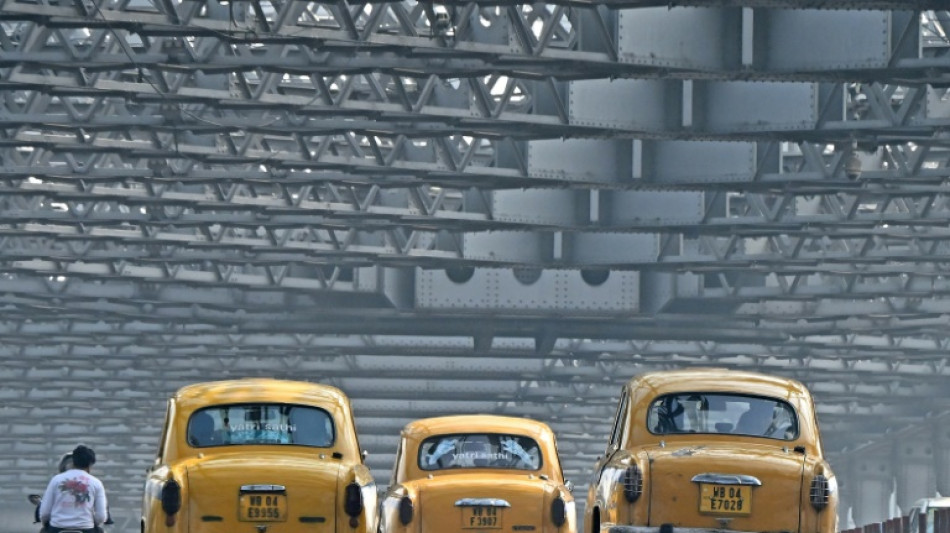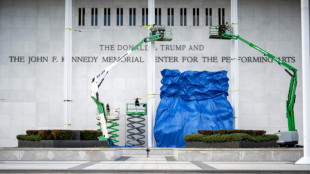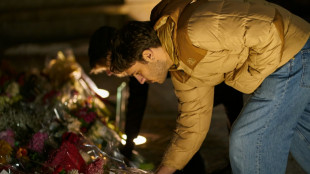
-
 Hodge edges towards century as West Indies 310-4, trail by 265
Hodge edges towards century as West Indies 310-4, trail by 265
-
US Afghans in limbo after Washington soldier attack

-
 England lose Duckett in chase of record 435 to keep Ashes alive
England lose Duckett in chase of record 435 to keep Ashes alive
-
Australia all out for 349, set England 435 to win 3rd Ashes Test

-
 US strikes over 70 IS targets in Syria after attack on troops
US strikes over 70 IS targets in Syria after attack on troops
-
Australian lifeguards fall silent for Bondi Beach victims

-
 Trump's name added to Kennedy Center facade, a day after change
Trump's name added to Kennedy Center facade, a day after change
-
West Indies 206-2, trail by 369, after Duffy's double strike

-
 US strikes Islamic State group in Syria after deadly attack on troops
US strikes Islamic State group in Syria after deadly attack on troops
-
Epstein files opened: famous faces, many blacked-out pages

-
 Ravens face 'special' Patriots clash as playoffs come into focus
Ravens face 'special' Patriots clash as playoffs come into focus
-
Newly released Epstein files: what we know

-
 Musk wins US court appeal of $56 bn Tesla pay package
Musk wins US court appeal of $56 bn Tesla pay package
-
US judge voids murder conviction in Jam Master Jay killing

-
 Trump doesn't rule out war with Venezuela
Trump doesn't rule out war with Venezuela
-
Haller, Aouar out of AFCON, Zambia coach drama

-
 Nasdaq rallies again while yen falls despite BOJ rate hike
Nasdaq rallies again while yen falls despite BOJ rate hike
-
Bologna win shoot-out with Inter to reach Italian Super Cup final

-
 Brandt and Beier send Dortmund second in Bundesliga
Brandt and Beier send Dortmund second in Bundesliga
-
Trump administration begins release of Epstein files

-
 UN Security Council votes to extend DR Congo mission by one year
UN Security Council votes to extend DR Congo mission by one year
-
Family of Angels pitcher, club settle case over 2019 death

-
 US university killer's mystery motive sought after suicide
US university killer's mystery motive sought after suicide
-
Rubio says won't force deal on Ukraine as Europeans join Miami talks

-
 Burkinabe teen behind viral French 'coup' video has no regrets
Burkinabe teen behind viral French 'coup' video has no regrets
-
Brazil court rejects new Bolsonaro appeal against coup conviction

-
 Three-time Grand Slam winner Wawrinka to retire in 2026
Three-time Grand Slam winner Wawrinka to retire in 2026
-
Man Utd can fight for Premier League title in next few years: Amorim

-
 Pandya blitz powers India to T20 series win over South Africa
Pandya blitz powers India to T20 series win over South Africa
-
Misinformation complicated Brown University shooting probe: police

-
 IMF approves $206 mn aid to Sri Lanka after Cyclone Ditwah
IMF approves $206 mn aid to Sri Lanka after Cyclone Ditwah
-
US halts green card lottery after MIT professor, Brown University killings

-
 Stocks advance as markets cheer weak inflation
Stocks advance as markets cheer weak inflation
-
Emery says rising expectations driving red-hot Villa

-
 Three killed in Taipei metro attacks, suspect dead
Three killed in Taipei metro attacks, suspect dead
-
Seven Colombian soldiers killed in guerrilla attack: army

-
 Amorim takes aim at Man Utd youth stars over 'entitlement'
Amorim takes aim at Man Utd youth stars over 'entitlement'
-
Mercosur meets in Brazil, EU eyes January 12 trade deal

-
 US Fed official says no urgency to cut rates, flags distorted data
US Fed official says no urgency to cut rates, flags distorted data
-
Rome to charge visitors for access to Trevi Fountain

-
 Spurs 'not a quick fix' for under-fire Frank
Spurs 'not a quick fix' for under-fire Frank
-
Poland president accuses Ukraine of not appreciating war support

-
 Stocks advance with focus on central banks, tech
Stocks advance with focus on central banks, tech
-
Amorim unfazed by 'Free Mainoo' T-shirt ahead of Villa clash

-
 PSG penalty hero Safonov ended Intercontinental win with broken hand
PSG penalty hero Safonov ended Intercontinental win with broken hand
-
French court rejects Shein suspension

-
 'It's so much fun,' says Vonn as she milks her comeback
'It's so much fun,' says Vonn as she milks her comeback
-
Moscow intent on pressing on in Ukraine: Putin

-
 UN declares famine over in Gaza, says 'situation remains critical'
UN declares famine over in Gaza, says 'situation remains critical'
-
Guardiola 'excited' by Man City future, not pondering exit


End of the road for Kolkata's beloved yellow taxis
Kolkata locals cherish their city's past, which is why many in the one-time Indian capital are mourning a vanishing emblem of its faded grandeur: a hulking and noisy fleet of stately yellow taxis.
The snub-nosed Hindustan Ambassador, first rolling off the assembly line in the 1950s with a design that barely changed in the decades since, once ruled India's potholed streets.
Nowadays it is rarely spotted outside Kolkata, where it serves as the backbone of the metropolitan cab fleet and a readily recognisable symbol of the eastern city's identity.
But numbers are dwindling fast, and a court ruling means those that remain -- lumbering but still sturdy -- will be forced off the roads entirely in the next three years.
"I love my car like my son," Kailash Sahani, who has sat behind the wheel of an Ambassador cab for the past four decades, told AFP.
"It's a simple car -- no electronics, no frills," the 70-year-old added. "It's unbelievable how much things have changed... The end of these taxi cars also marks our end."
Sahani is among thousands of Kolkata cabbies relinquishing their vehicles in line with tough emissions standards introduced in 2009 to ease the city's endemic smog problem.
Only around 2,500 Ambassador taxis were still working at the start of this year, down from 7,000 a year earlier, according to Bengal Taxi Association figures.
Another 1,000 will be retired this year, and West Bengal state transport minister Snehasis Chakraborty told AFP that the remainder will be gone by the end of 2027.
"The car is strong. Parts and maintenance are cheap and if it breaks down, it's easy to find a mechanic," said Bengal Taxi Association spokesman Sanjeeb Roy.
Their disappearance, he added, "represents all that's wrong with India's changing economy".
- Litany of defects -
The Hindustan Ambassador was the cornerstone of India's automotive industry for decades from its 1957 debut at a factory on Kolkata's northern outskirts.
Modelled on a similarly regal sedan car from Britain's now long-defunct Morris Motors, the car was a triumphant achievement of industry in the first years of India's history as an independent nation.
A deluxe model, its windows adorned with lace curtains, was for years the main means of conveyance for government ministers and captains of industry.
But the car's shortcomings also served as a reminder of deep structural problems with the quasi-socialist economic system that prevailed in India at the time.
Buyers sat on wait lists for years because pervasive red tape stopped Hindustan Motors from raising production to meet demand, while a near-monopoly on sales left no incentive to maintain quality standards.
That gave rise to an oft-repeated joke about the litany of defects found in the average "Amby": the only thing in the car that doesn't make a sound is its horn.
Market reforms from the 1980s onwards saw the Ambassador muscled off Indian roads by more modern vehicles, and production was halted entirely in 2014 after years of flatlining demand.
- 'Get with the times' -
Kolkata, the headquarters of Hindustan Motors, is the last place where the cars are seen in any great number -- a reminder of the tethers binding the city to India's past.
Grand public buildings evoke the immense riches that flowed through the city's tree-lined boulevards back when it was the second-largest city in the British Empire, after London.
Nobel laureate poet and polymath Rabindranath Tagore was born and died in Kolkata, where the national anthem he composed was sung for the first time during India's long independence struggle.
The city is also renowned for its thrumming nightlife, with crowded and dimly lit restaurants serving up chicken Kiev alongside the same suite of old-world European staples that have been listed on their menus since the late colonial era.
But its importance has shrunk dramatically since that heyday, first with the relocation of India's capital to Delhi in 1911 and then with Mumbai's ascension as the country's most important commercial hub.
Many of Kolkata's younger generations have left in search of better opportunities elsewhere, giving it a median age at least six years older than other big Indian cities, according to census data.
The city's skewed demographics prompted its pre-eminent novelist Amit Chaudhuri to once quip that while Delhi was for seeking power and Mumbai was for chasing riches, Kolkata was for visiting one's parents.
"People like me are under pressure to get with the times," retired Kolkata schoolteacher Utpal Basu, 75, told AFP.
"Old cars go, new ones come," he added. "But it will break my heart when the city loses another icon."
E.Schubert--BTB
